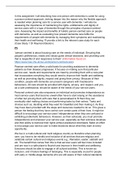In this assignment I will describing how one person with dementia is cared for using
a person-centred approach, delving deeper into the reason why the flexible approach
is needed when planning care for a service user with dementia. I will also be
assessing the importance of maintaining the rights, entitlements and dignity of
service users with d a type of dementia through the principles of person-centred
care. Assessing the impact and benefits of holistic person-centred care on people
with dementia, as well as evaluating how present dementia care fulfils the
requirements of people with dementia by managing their symptoms and maintaining
their health and well-being. I'll provide a link to the relevant case study for each
(Case Study 1 Dr Raymond Boston).
P5
“person-centred is about focusing care on the needs of individual. Ensuring that
people's preferences, needs and values guide clinical decisions, and providing care
that is respectful of and responsive to them” (Information found on
https://www.hee.nhs.uk/our-work/person-centred-care).
Pearson-centred care offers a solid basis for providing assistance to dementia
patients as their disease progresses. It focuses on making sure that particular
service user, needs and requirements are meet by providing them with a care plan
that incorporates everything they would need to improve their health and wellbeing
as well as promoting dignity, respect and giving them privacy. Because of their
condition, people with dementia can present caregivers with troublesome
behaviours. All care should be provided with dignity, privacy, and respect, and you,
as a care professional, should be aware of the needs of your service users.
Personal centred care also empowers an individual and promotes independence as
most service users that become unwell often have to start relying on the assistance
of other but proving them with care that is personalised to fit them they can
eventually start making choices and performing tasks by their selves. Tasks and
choices such as, deciding what they want for breakfast and then making it. As they
may have been provided with the steps and resources needed to do so. This gives a
person the feeling that they have control over certain parts of their lives. It might be
difficult to encourage your service users' independence when they are confused or
exhibiting problematic behaviours. However, as their advocate, you must promote
independence and empower your service user, especially as their sickness develops
and their ability to exercise their rights without assistance decreases. Make an effort
to encourage your service user to make decisions about what they want at every
opportunity.
We live in a multi-cultural and multi religious country so therefore when planning
care, you have to be mindful and inclusive of all services that are religious and
celebrate certain cultural and religious events e.g., Ramadan, easter, sabbath and
etc. The benefit that comes from this is that servicer users will feel more included
and are now in a safe place to flourish and improve in then health and wellbeing.
Everyone should be able to engage in all cultural activities. This is known as
inclusion, and it fosters feelings of belonging. This is especially crucial for people
with early or middle-stage dementia who are still aware of their cultural standards
, and who may feel detached or excluded from what is going on around them due to
confusion or a loss of communication capacity. It is critical that you are sensitive to
your service users' specific norms and are mindful of every limitation that may apply.
This is especially crucial for people with dementia, as they may forget several of the
core aspects they have always followed as their dementia worsens. For example, in
Islam every meat that they consume must be halal however, having dementia may
cause them to forget this and they may accidently try meat that is not halal. That’s
where the caregivers come into remind them and make sure that they are still
following and observing their religious beliefs even if they forget.
In case study one, we have 76 year old Raymond Boston that has vascular dementia
, he had been previous living alone with support from his daughter and admiral
nurses that would come and visit him and offer additional support. However,
overtime his dementia gradually become worse and it was clear that he we unable to
mange hm self like before. He would often lash out at the admiral nurses that came
to visit him and accuse them of been intruders and thieves when they come to offer
support and help. His daughter had a child of her own that had additional needs and
require her full time care, so she was able to give her dad the full support he need
either. The decision was made for him to be moved into a residential home in order
to get the right care needed for him. He was admitted to Red Rooves Residence
where staff in the residence created a care plan with the help from his daughter that
is based on his needs. Within the care plan it covers all of Raymond’s likes and
dislikes as well as different barriers that could come up while he is living at the
residence.
On his care plan it incorporates serval of his needs that he would need assistance
with , this is applied to the fact that his general forgetfulness causes him to forget
to take his medication so its important that the staff see him take the medication
rather then placing it in his hand and walking away. For his general safety and the
safety of others. Raymond often likes to go out into the residence garden to sit and
read. How the staff at the residential home help him with this need is buy locking the
gate to prevent him from being disturbed and potentially wondering off in to the road.
Raymond has difficulties sleeping and feels agitated, but only in the early hours of
the morning. The workers come over and sit with him till he falls asleep again. By
doing this they are assisting to he needs as well as safeguarding.
On Raymond care plan, it also covers his interest as well as his likes and a range of
activities in within the residential home. Raymond is a retired general practitioner
(GP) who still has a passion for medicine. Another retired GP lives at the care home,
and Raymond enjoys discussing old cases and sharing medical magazines with him
that has been brought in by his daughter. Raymond enjoys watching documentaries
and taking notes on what he says and the discussions he has throughout the day.
Another way that personal centred care was applied to Raymond care is the fact that
he prefers s to be addressed by his title (Doctor) and the staff have all agreed to this
and it has ben included on his care plan that he is to be addressed as Dr Boston.
P6





